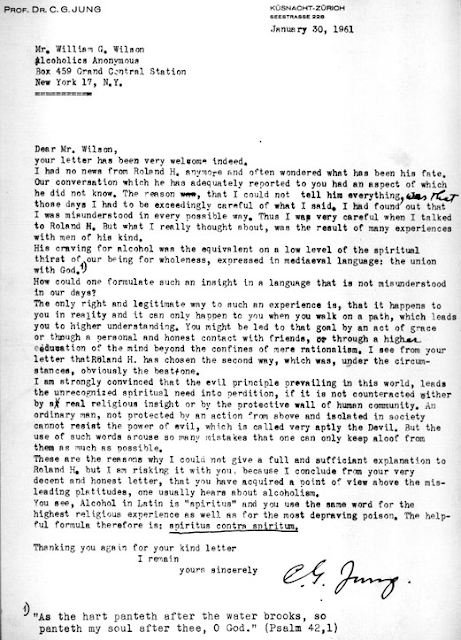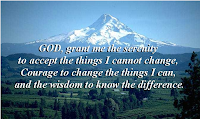"The average man is not humble; he may appear to be so, but inwardly he sets up mental resistance and barriers, and builds walls of prejudice against the truth. Humility consists in having a perfectly open mind, as though you were a new-born, and being able to receive with complete faith not only the words of those who know, but that which is still more important, that which is behind words, which is Spirit."
[Paul Brunton, "Discover Yourself," p. 68.]
The most leveling, the most humbling experience when we undertake the work of recovery - once we have admitted that life was is and will remain unmanageable - is most typically taking and sharing a moral inventory.
Yet it is only through this process of self-scrutiny, and sharing its result with another person, that we can begin to deconstruct the root of our difficulty - egoism. We face who we are in front of the God of our own understanding and another person so that we no longer have to keep up the false pretenses we have been living our lives under
"More than most people," we read, "the alcoholic leads a double life. He is very much the actor. To the outer world he presents his stage character. This is the one he likes his fellows to see. He wants to enjoy a certain reputation, but knows in his heart he doesn't deserve it."
In the "Co-Founders" pamphlet, Dr. Bob relates how at the very beginning of A.A., when it was just Bill, Bob and Bob's wife, Anne, sitting around their kitchen table in Akron, they found inspiration from the Bible, with the "Beatitudes," I Corinthians 13, and the Book of James being "absolutely essential" as they tried to carve out a life of sobriety and spiritual growth.
Yet it is only through this process of self-scrutiny, and sharing its result with another person, that we can begin to deconstruct the root of our difficulty - egoism. We face who we are in front of the God of our own understanding and another person so that we no longer have to keep up the false pretenses we have been living our lives under
"More than most people," we read, "the alcoholic leads a double life. He is very much the actor. To the outer world he presents his stage character. This is the one he likes his fellows to see. He wants to enjoy a certain reputation, but knows in his heart he doesn't deserve it."
[Alcoholics Anonymous, page 73.]
In the "Co-Founders" pamphlet, Dr. Bob relates how at the very beginning of A.A., when it was just Bill, Bob and Bob's wife, Anne, sitting around their kitchen table in Akron, they found inspiration from the Bible, with the "Beatitudes," I Corinthians 13, and the Book of James being "absolutely essential" as they tried to carve out a life of sobriety and spiritual growth.
"A double-minded man is unstable in all his ways," we read in the Book of James, (James 1:8). Yet, further on, we also find an answer to the double life that we have been leading. "Draw near to God, and God will draw near to you," we read. "Wash clean your hands ye sinners; purify your hearts, ye double minded." (James 4:8).
These passages speak to the process of self-examination that we must go through before we can rid ourselves of the memories, fears and old ideas that are the raw fuel of the ego, the mental clutter which keep us separated and apart from both God and our fellow man.
How can I establish and then improve my conscious contact with a Power greater than my "self," if I am wholly caught up in the self-centeredness of egoic thinking? At that point, when haunted by what lurks in the dark crevasses of my lonely and separated ego, I have conscious contact only with my self and my old ideas and distorted memories.
These passages speak to the process of self-examination that we must go through before we can rid ourselves of the memories, fears and old ideas that are the raw fuel of the ego, the mental clutter which keep us separated and apart from both God and our fellow man.
How can I establish and then improve my conscious contact with a Power greater than my "self," if I am wholly caught up in the self-centeredness of egoic thinking? At that point, when haunted by what lurks in the dark crevasses of my lonely and separated ego, I have conscious contact only with my self and my old ideas and distorted memories.
Being honest, many of us were told, means we no longer have to remember the story. Being truly humbled, I would add, means we never have to remember who to be in any given situation. In this way, and this way only, can we truly develop and foster a truly "open mind" cleansed from all the "calamity, pomp and worship of other things" that have separated us from our fellow beings and from the perhaps unsuspected Spirit we all have deep down within us.
[Alcoholics Anonymous, page 55.]













































